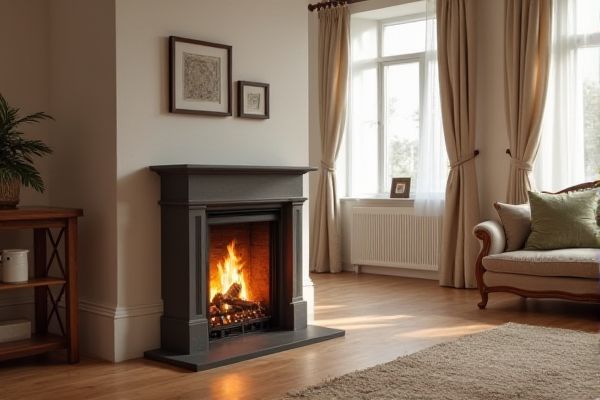
Electric heaters provide efficient, safe, and easy-to-install heating solutions ideal for smaller spaces or supplemental warmth, while gas heaters offer powerful, cost-effective heating for larger areas but require ventilation and careful maintenance. Discover the key differences to determine which heater best suits Your needs by reading the rest of the article.
Table of Comparison
| Feature | Electric Heater | Gas Heater |
|---|---|---|
| Energy Source | Electricity | Natural Gas or Propane |
| Heat Efficiency | Near 100% | 70% - 90% |
| Operating Cost | Higher (depends on electricity rates) | Lower (depends on gas prices) |
| Installation | Simple, portable options available | Requires gas line and ventilation |
| Maintenance | Low maintenance | Regular maintenance needed |
| Safety Risks | Minimal (no combustion) | Risk of gas leaks and combustion hazards |
| Environmental Impact | Depends on electricity source (cleaner with renewable) | Emits carbon dioxide and pollutants |
| Heating Speed | Slower heat-up | Faster heating |
| Best For | Small spaces, supplemental heating | Larger spaces, whole-house heating |
Introduction: Electric vs Gas Heaters
Electric heaters convert electrical energy directly into heat with nearly 100% efficiency, making them ideal for small spaces and precise temperature control. Gas heaters burn natural gas or propane, offering lower operational costs and rapid heating suitable for larger areas but require proper ventilation due to emissions. Choosing between electric and gas heaters depends on factors like energy prices, installation costs, space size, and environmental considerations.
How Electric Heaters Work
Electric heaters convert electrical energy into heat through resistive heating elements that generate warmth when an electric current passes through them. These heaters use materials like nichrome wire, which resist electrical flow, causing the element to heat up and radiate warmth into the surrounding air. Electric heaters offer precise temperature control, efficient energy conversion, and produce no combustion byproducts, making them suitable for indoor heating.
How Gas Heaters Operate
Gas heaters operate by burning natural gas or propane to generate heat, which is then distributed through convection or forced air systems. These heaters rely on combustion chambers and heat exchangers to transfer warmth efficiently while venting exhaust gases safely outside. Your choice between gas and electric heaters should consider factors like fuel availability, installation cost, and heating efficiency.
Energy Efficiency Comparison
Electric heaters convert nearly 100% of electrical energy into heat, making them highly efficient at the point of use, while gas heaters typically operate at 70-90% efficiency due to energy loss during combustion and venting. However, the overall energy efficiency of electric heaters depends on the electricity source, with renewable energy enhancing their environmental benefits compared to natural gas combustion. Gas heaters often provide faster heating and lower operational costs in regions with inexpensive natural gas prices, but electric heaters offer a cleaner alternative with zero on-site emissions.
Installation Requirements and Costs
Electric heaters require minimal installation, often just a nearby power outlet, making them cost-effective upfront with no need for ventilation or gas lines. Gas heaters demand professional installation due to the necessity of connecting to gas lines and ensuring proper venting for safety, leading to higher initial costs. Your decision should consider long-term expenses, as gas heaters typically have higher installation costs but may offer lower operating costs depending on fuel prices.
Running Costs and Long-term Savings
Electric heaters generally have higher running costs compared to gas heaters due to the higher price of electricity per unit of energy. Gas heaters offer long-term savings by using natural gas, which is often more affordable and efficient for continuous heating needs. You can reduce your overall expenses by choosing a gas heater for large spaces or extended use, while electric heaters may be more cost-effective for occasional or localized heating.
Environmental Impact and Emissions
Electric heaters produce zero on-site emissions, making them a cleaner choice for indoor air quality, while their overall environmental impact depends on the electricity source's cleanliness. Gas heaters emit carbon dioxide, nitrogen oxides, and other pollutants directly into your home, contributing to indoor air pollution and higher greenhouse gas emissions. Choosing an electric heater powered by renewable energy significantly reduces your carbon footprint compared to gas heaters that rely on fossil fuels.
Safety Considerations
Electric heaters reduce the risk of carbon monoxide poisoning as they do not produce harmful fumes, making them safer for indoor use. Gas heaters require proper ventilation to prevent the buildup of dangerous gases and must be regularly maintained to avoid leaks and explosions. Safety features like automatic shut-off mechanisms and tip-over protection are more commonly found in electric heaters, enhancing their overall safety profile in residential settings.
Maintenance and Lifespan
Electric heaters require minimal maintenance, mainly involving regular dusting and occasional inspection of electrical connections, contributing to a lifespan of 10-20 years depending on usage and build quality. Gas heaters, however, demand more frequent maintenance, such as annual servicing of burners and ventilation systems to prevent carbon monoxide leaks, which can extend their lifespan to around 15-25 years with proper care. Efficient maintenance schedules and correct installation significantly impact the durability and safety of both electric and gas heating systems.
Which Heater Is Right for You?
Choosing between an electric heater and a gas heater depends on your home's energy availability, heating efficiency, and safety preferences. Electric heaters offer cleaner operation with easy installation and lower upfront costs, while gas heaters provide faster, more cost-effective heating for larger spaces but require proper ventilation. Assess your home's layout, energy bills, and maintenance capacity to determine which heater best suits your comfort and budget needs.
 homyna.com
homyna.com